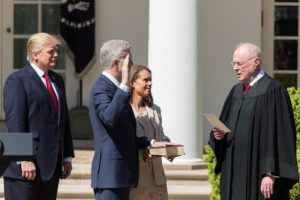
Ilya Shapiro, The Cato Institute’s senior fellow in constitutional studies, writes that the court’s slow pace in decisions this Spring has less to do with its newest appointed justice, Neil Gorsuch, and more to do with the full slate of complicated decisions sitting before the court. Despite that, Shapiro says the decisions handed down thus far have shed some light on what type of justice Gorusch will be, and how he differs from others on the bench. Shapiro writes:
The Supreme Court is on a record slow pace for deciding cases this term, leading to speculation that the justices are having a hard time incorporating their newest colleague, Neil Gorsuch. Of course, the real issue is more likely to be that, after an eight-justice year when the court shied away from particularly difficult issues, the justices have a slew of controversial cases on their hands, ranging from compelled support of unions to compelled baking of wedding cakes, to sports gambling to partisan gerrymandering to the travel ban.
Regardless, we can actually discern quite a bit about the court’s internal dynamic from the lower-profile opinions that come down while we await those big cases. Indeed, it’s often the cases with less political valence where the justices can “nerd out” on legal theories and reveal their jurisprudential minds when they know their decisions won’t make the front pages.
Such was the case where a series of recent decisions teased out differences between justices Gorsuch and Clarence Thomas. In Gorsuch’s first (abbreviated) term, these two were together on all the cases they heard together, leading some observers to wonder whether the new justice was less like the man he replaced, Antonin Scalia, and more like the most court’s most conservative member.
Gorsuch and Thomas actually diverged several times this term—on the early statistics, Gorsuch is closer to Chief Justice John Roberts and Justice Anthony Kennedy, but the last two weeks of April really showed the variance in their approaches. While both are originalists and textualists, with a deep devotion to constitutional text, structure, and history, they sometimes come out differently when the law is unclear. That’s not particularly surprising to anyone who’s been following the relevant legal debates, but it should give pause to anyone who thinks that “originalism” is code for conservative policy results.
Read more here.



